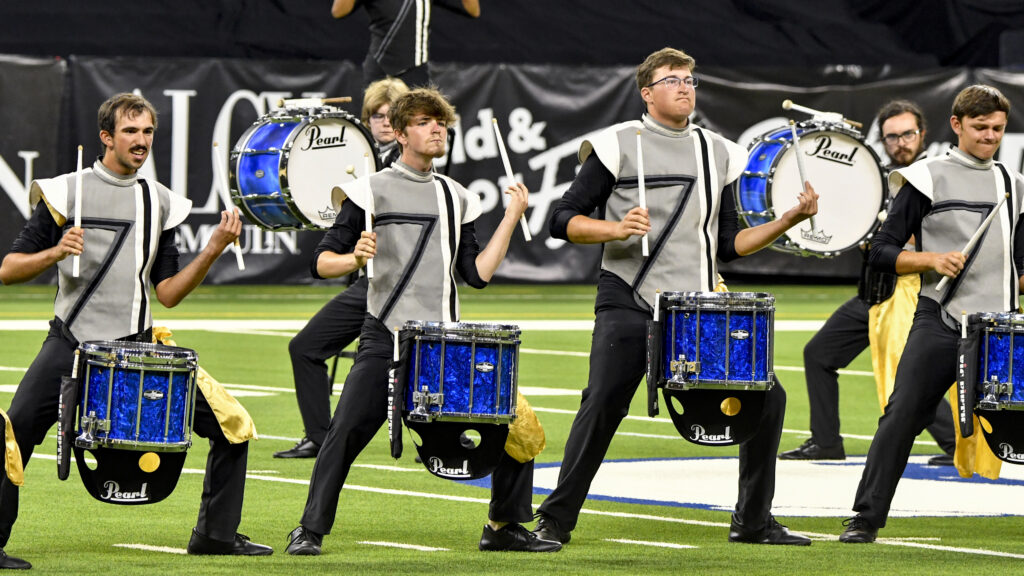
In 2003, the captain of the Glassmen drum line came up with 10 or 15 rules we were all supposed to follow. Most of the rules were never even iterated, let alone memorized and adhered to, but one rule was frequently quoted throughout the summer and to some of the Glassmen drum lines that came after 2003. It has taken on a mythic quality; I’m not sure that all the people who refer to it even know where it came from, the context of its genesis, or its application. But it’s probably the most important skill I took from my three years of drum corps. It’s Rule #9: “Figure it out.”
Rule #9 could apply to any drum corps situation, on or off the field: “How am I supposed to do a direction change out of a backwards jazz run into an eight-to-five for 24 counts?”
“Figure it out!”
“How am I supposed to load the truck, eat, shower, load all my stuff and be on the bus in under an hour?”
“Figure it out!”
“How do I find time to work on this part of the show if …” Well, you get the picture. We even turned the rule into a verb: Someone asking, “How do I …” was immediately told to “Rule #9 it.” Anyone who had already been told how to do what they needed to do and was asking again was told to “Just Rule #9 it, man.” It was the functional equivalent of Nike’s “just do it,” but had the force of an implicit threat; it was a message that you had been given the information you needed and it was time to do your part – a form of social regulation that would make an anthropologist drool. We weren’t being deliberately cruel or intentionally vague; legitimate questions were answered with real information. Everyone was taught the necessary skills to be successful in what they were being asked to do. But there isn’t an answer for every procedure in drum corps life. A big part of surviving on tour is developing the ability to, well, Rule #9 it.
And I think, if you’ll permit me to get up on my soapbox for a moment, “figuring it out” is a skill that is too often devalued in our society as a whole. Generations of children, from me at 25 on down to my six-month-old baby sister, have been so pampered, so catered to, had every need so provided for, that when faced with a challenge or a new and unexpected situation, they simply crumple. They expect every answer to be provided, every step enumerated, every skill laid out simply and every misstep forgiven. I marched with kids who, at college age, had never done their own laundry and had no concept of sharing space on the bus or making do with peanut butter and jelly if they didn’t like the main course. I also witnessed up close and personal the parental pandering that causes such behavior while I was on staff with various high school bands. Perhaps unfortunately, most of these overgrown kindergartners don’t make the cut to get on the bus in the first place; I say unfortunately because they are the type that would likely benefit from the activity the most. But some do make it through. Which brings us back to Rule #9.
I always say that I learned more in three months on the road than I did in three-plus years at a fancy private research university, and it’s true: While I learned a lot of facts and skills during my first degree, I learned about real life and how to cope with it while I was on tour every summer. One of the best things I learned was Rule #9. I apply it all the time from playing in ensembles, to obscure chords in music theory class, to driving in rush hour traffic, to balancing my checkbook, even to fitting the simple act of eating into my ridiculously packed daily schedule. Ultimately, it’s how I survived two years of participating in drum corps administration without totally derailing the corps. And, it’s how I help my students become participatory, self-reliant learners. Lest I present myself as having all the answers, I can honestly say that Rule #9 was something I sorely needed by the time I happened upon someone kind enough to say it to me, and I wish it was something I’d figured out for myself – no pun intended – a little sooner. But I guess later is better than never for me and for all the other kids who need someone who believes in them enough to challenge them to take on life’s intricacies and affronts. And I hope it’s an ethic we can bring back to American society, which is, after all, based on the idea of plunging wildly into the unknown and making it up as you go along. At the very least we can perpetuate the idea within the activity, which is perhaps even more so based on the idea of plunging wildly into the unknown and making yourself equal to the challenge.
“How do you do it?” people who live outside the activity ask me. “How can you rehearse so many hours in the sun when it’s so hot and humid outside? How can you sleep on a bus half the night? How can you make do on one bag for 10 weeks? How can you keep doing it, day after day after day, all summer long?”
I just shrug. “I don’t really know,” I try to explain. “I guess you just have to Rule #9 it. You just … figure it out.”
Emily Tannert is a music education/percussion performance major at Louisiana State University in Baton Rouge, La., and holds a journalism degree from Northwestern University. Emily graduated from the Glassmen in 2003 and was assistant tour manager for the corps in 2004 and 2005. You can contact Emily at [email protected].





